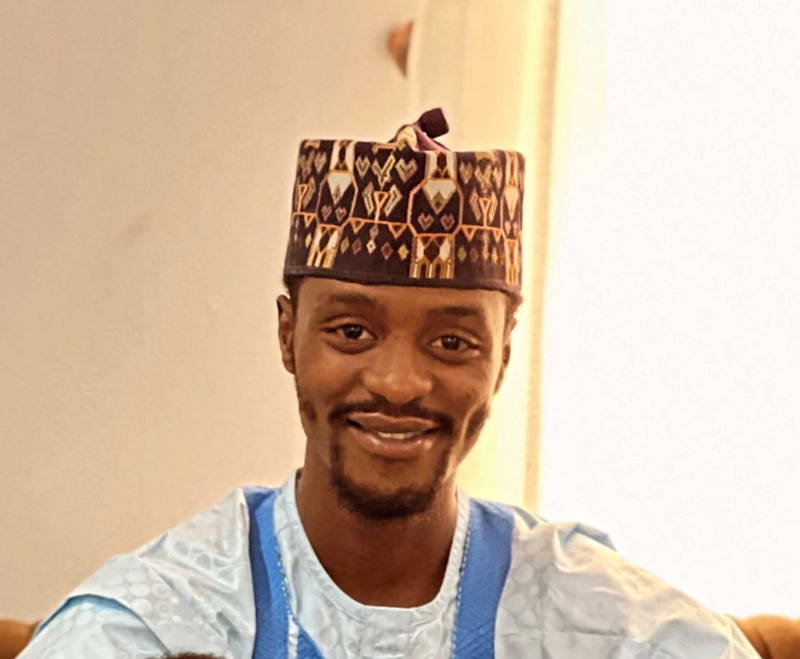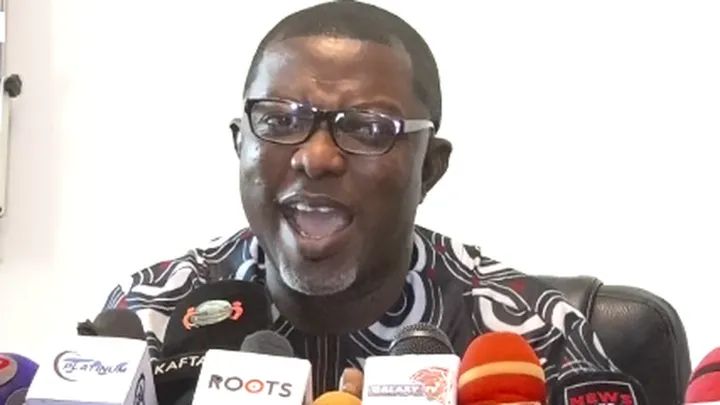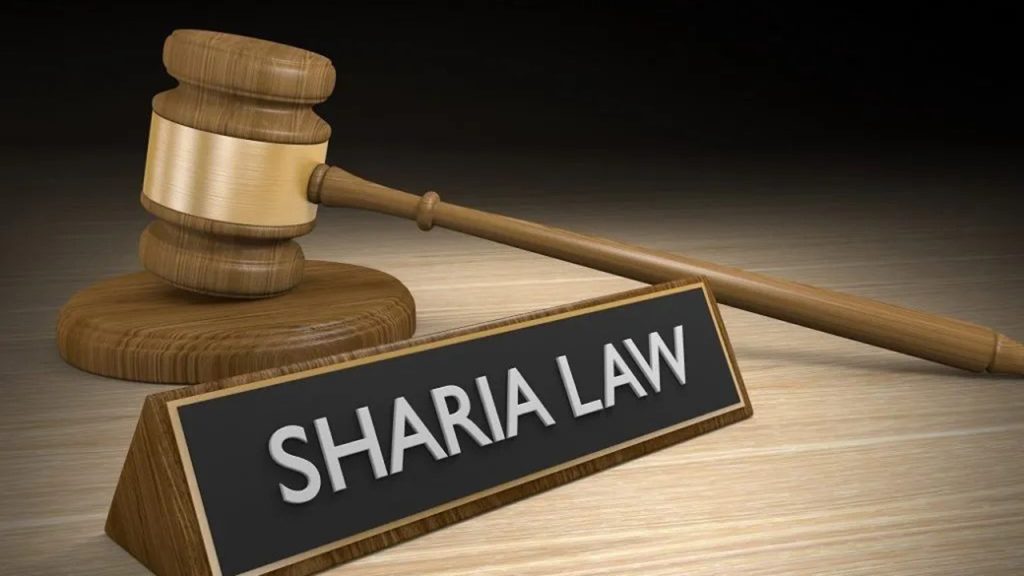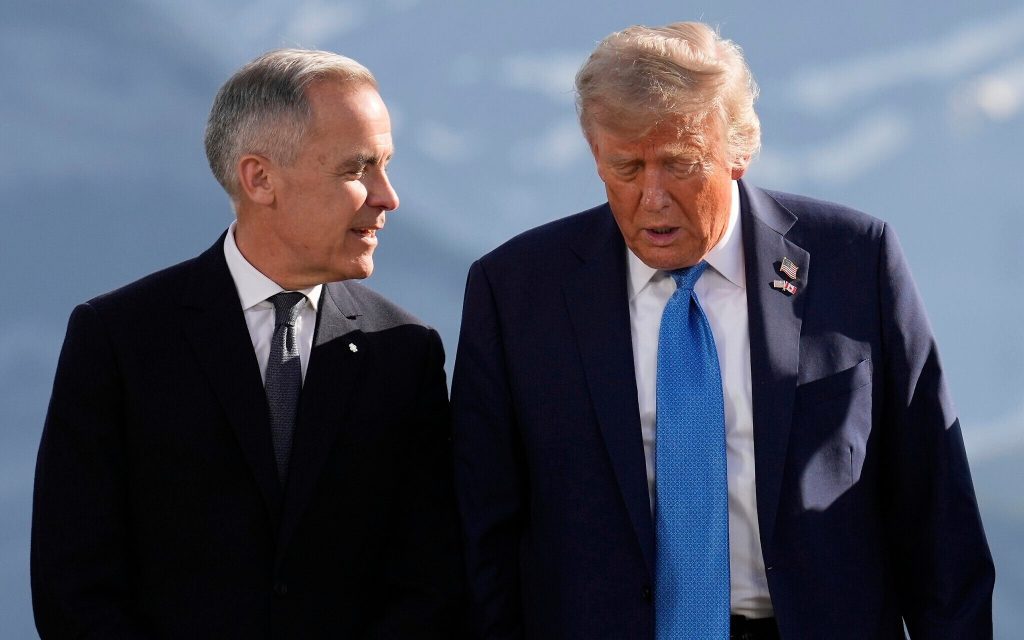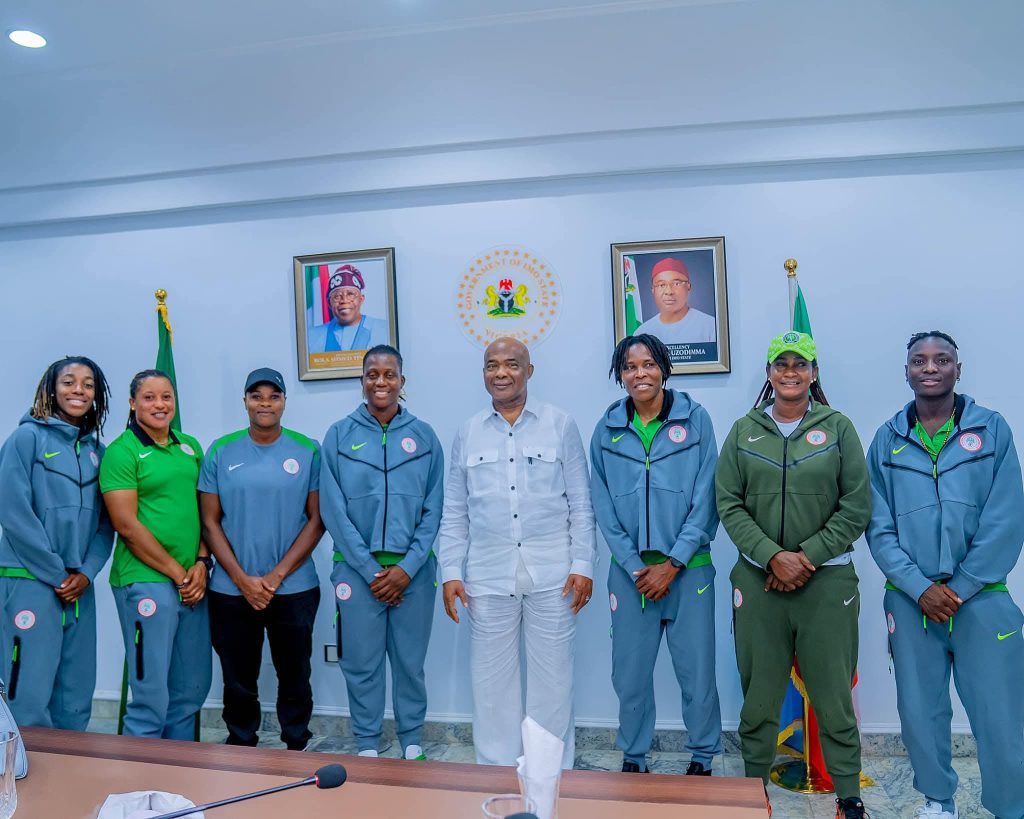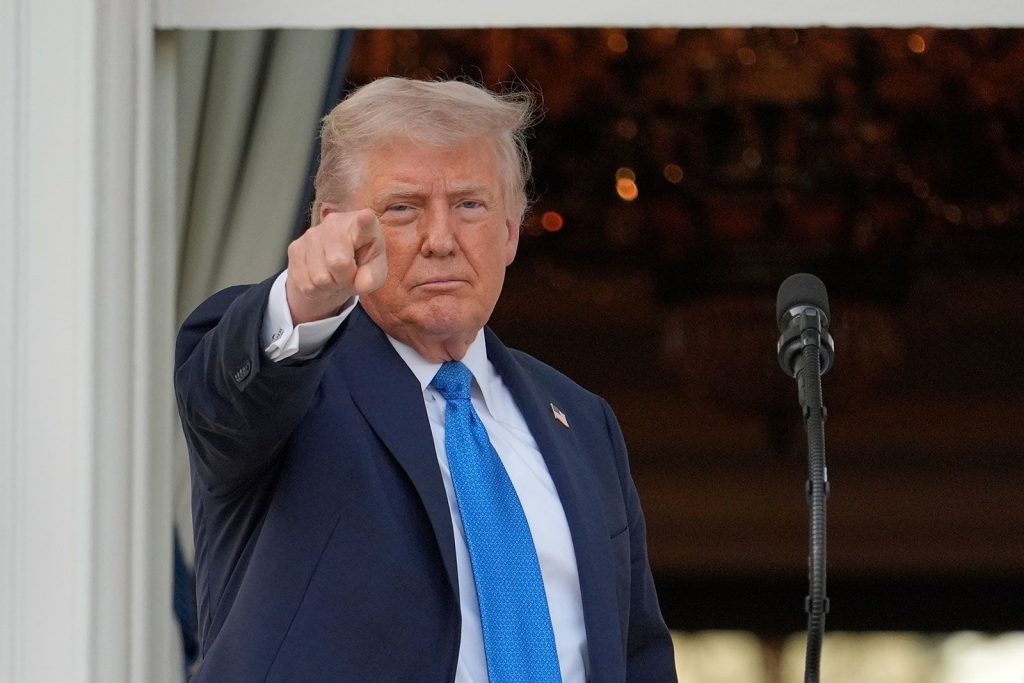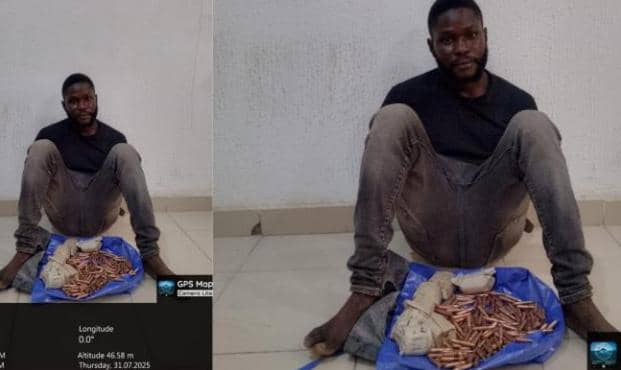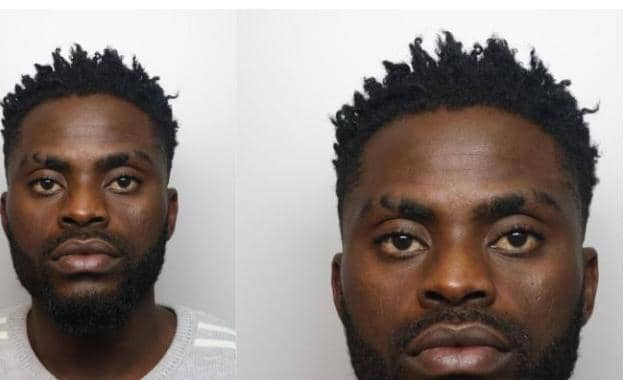Featured
Anambra Governors, Counsels Shy Away From Court As Ifeanyi Okonkwo Set To Demolish “Unconstitutional” Caretaker Committees
Plaintiff urges court to proceed with hearing of the matter

Governors of Anambra State, past and present, as well as their Counsels and/or representatives were nowhere to be seen at the court when a matter involving them came up on the cause-list on Thursday, July 24, 2025, in the Federal High Court of Anambra State of Nigeria, Awka, before His Lordship Hon. Justice B.K.M. Mohammed
When the case was called up, the plaintiff/applicant, a human rights activist, Dr. Ifeanyichukwu Okonkwo, appeared in person, poised for action to dismantle the “illegal” and “unconstitutional” Caretaker Committees used by the state governments to misapply state funds.
However, all defendants/respondents were absent, though their counsel was served, and they were not represented by any counsel.
The suit with file no. FHC/AWK/CS/90/2024, pending before Court No. 2, was between Dr. Okonkwo, the plaintiff/applicant, and the following defendants:
- Federal Republic of Nigeria defendant
- Governor of Anambra State
- Attorney General & Commissioner for Justice Anambra State
- Anambra State House of Assembly
- Former governor Chief Dr. Christopher Ngige (for himself, and on behalf of – the Local Government Transition Chairmen and Councilors (Committees), unconstitutionally appointed and served under his regime for the period 2003 – 2006 years)
- Former governor Mr. Peter Obi (for himself, and on behalf of – the Local Government Transition Chairmen and Councilors (Committees), unconstitutionally appointed and served under his regime for the period 2006 – 2014 years)
- Former governor Chief Dr. Williams Maduabuchukwu Obiano (for himself, and on behalf of – the Local Government Transition Chairmen and Councilors (Committees), unconstitutionally appointed and served under his regime for the period 2014 – 2021 years)
- Mr. Livinus Onyenwe (for himself and on behalf of the Local Government Transition Chairmen and Councillor’s (Committee) unconstitutionally appointed and serving under the regime of Professor Chukwuma Charles Soludo (current governor of Anambra State).
Okonkwo, the plaintiff, urged court to proceed with hearing of the matter as the respondents evidently have no defence to make.
He asked the court to “adopt this case ‘mutatis mutandis'”, an expression requesting the court to apply reasoning or legal principles from a prior case to the current one, with the necessary modifications to account for any differences in facts or circumstances.
The case, however, suffered a setback when, following the absence of the defendants, Justice Mohammed, on his own Motion, directed:
“The Plaintiff/Applicant [sought] to address the Court on the propriety of moving a Motion for himself before the Court on his behalf. The case adjourned to 24th September, 2025 for hearing.”
Okonkwo, in response, fired a written submission.
Under the subtitle, “Statement of Fact”, pursuant to order of the court dated July 24 that adjourned the matter simply because the Counsels and/or representatives were absent at the court while the plaintiff/applicant appeared in person for himself without a formal legal representative, the plaintiff questioned the decision of the court not to take up or consider the matter on its own motion, without a formal request from the respondents.
In the question for determination before the court, he contended:
“The Constitution of the Federal Republic of Nigeria 1999 (as amended) under Section 36(1)(a): “Provides for an opportunity for the person whose rights and obligations may be affected to make representations to the administering authority before that authority makes the decision affecting that person…
“Therefore, Section 36(1) of the Constitution of the Federal Republic of Nigeria, 1999 (as amended) imputes [the right of] a person to be heard in any court of law.
“The right conferred in Section 36(1)(a) to make representations and cite laws to advance their case/matter before Courts created under the Nigeria’s constitution, and such right cannot be impaired, or the party compelled to instruct Counsel.”
He further cited the Court of Appeal in the case of AKULEGA vs. B.S.C.S.C which opined that “the right to fair hearing is a constitutional right available to all citizens of Nigeria, particularly in a court of law”.
The 1979 Constitution applicable in this appeal, Okonkwo contended, provides as follows:
“The principle of “audi alteram partem” enshrined in our constitution as fair hearing means no more than offering the other party an opportunity to be heard.
“It does not mean that the other side must willy-nilly be heard either in person or through a counsel. What it means is that the other side must be given an opportunity to be heard.
“Once the other side is offered an opportunity to be heard, whether he avails himself of the opportunity and the manner he proposed to exercise the right is left purely to his discretion.”
The Constitution continues: “The principle of natural justice and fair hearing of each party to a dispute must have notice of the case he has to meet and be given an opportunity of stating his case and answering, if he can, any arguments or allegations put against him.
“The denial of an opportunity to be heard is an injury to the right of fair hearing, guaranteed by Section 33 of the 1979 Constitution.” (Emphasis ours.)
The plaintiff, therefore, submitted that the principle of natural justice, enacted in the Constitution, conferring the right of fair hearing on citizens of Nigeria is unrestricted or un-impaired.
He cited the Supreme Court’s ruling which states: “Every person who is charged with a criminal offence shall be entitled to “defend himself in person or by legal practitioners of his own choice,” which right to fair hearing applies in both civil and criminal proceedings.
He stated further: “The apex Court gave its pronouncement in, whether right to legal representation in civil as opposed to criminal cases are the same.
“Karibi-Whyte and Oputa JJSC opined as follows: “The right to present one’s case at a hearing involves the right to brief counsel to do so. An exercise of a discretion which deprives a litigant of an effective exercise of the right to present his case resulting in the dismissal of his appeal, as was in this case, is without doubt not a valid exercise of discretion…
“The question that now arises is – Will this right of defence by counsel of one’s own choice apply also in civil cases and appeals? …the rationale of the rationes decidedendi in criminal cases, on principle, ought in my view, to apply in civil cases and to civil appeals.”
Also, citing the Court of Appeal in M.M.C.C. LTD vs. UMRA & CO. NIG. LTD., the Court pronounced upon the issue of whether litigant has right to conduct his case by himself and not by a lawyer.
The court held thus: “From the foregoing provision, the brief before this court is devoid of all ingredients of a brief. The fact that the appellant chose to conduct his appeal by himself is no excuse for not filing what should be seen to be a brief of argument.
“The Constitution of this country gives a party to a dispute the right to conduct his case either by himself or by a lawyer of his choice. Where a party has chosen to conduct his case by himself in the face of the number of lawyers in the country, he has himself to blame.
“In this appeal, the appellant had a counsel throughout the trial in the court below. He may have found that it was useless retaining a lawyer since he could conduct his case himself. (Emphasis ours.)
The human rights activist contended that it is not compulsory for a litigant to engage the services of a legal practitioner, as it is not every litigant that can afford the services of one.
He noted that what the court did in asking the Plaintiff to address the Court on whether a lay litigant can address the court, amounts to taking away from the Plaintiff a right guaranteed under the Constitution.
“For the court to refuse to appreciate the rights clearly conferred on the citizen by the constitution, creating the impression that its enjoyment is subject to such provisor as that he must show that his accusers have failed to prove their case against him, is to say the least not in the spirit of the provisions set out in Section 33 of the 1979 Constitution and the provisor to section 33(a) which I had high-lighted earlier,” Okonkwo stated.
He also insisted that a litigant, whether a legal practitioner or a layman, who conducts his case in person has the right like any legal practitioner who appears and acts for a client to cite authorities to advance his case.
In urging the court to adopt the case summarily, having won cases he stood for himself in the past, he cited the following cases ruled in his favour as evidence in support of the written address:
1) The Order of the Court of Appeal Enugu Judicial Division in Appeal No. CA/E/211/2008 between: Ifeanyichukwu Okonkwo vs. Central Bank of Nigeria dated Thursday the 4th day of November, 2010 presided by Justice Amina A. Augie.
2) The Judgment of the Federal High Court of Nigeria, Enugu Judicial Division in Suit No. FHC/EN/CS/139/2006 between: Ifeanyichukwu Okonkwo vs. Central Bank of Nigeria, dated Monday the 18th day of February, 2008, delivered by Justice A.O. Faji.
3) The Ruling of the Federal High Court of Nigeria, Abuja Judicial Division in Suit No. FHC/ABJ/CS/249/2007 between: Mr. Ifeanyichukwu Okonkwo vs. Federal Republic of Nigeria & Ors., dated Monday the 26th day of January, 2009 delivered by Justice M.G. Umar.
4) The Order of the Federal High Court of Nigeria, Enugu Judicial Division in Suit No. FHC/EN/CS/247/2007 between: Mr. Ifeanyichukwu Okonkwo vs. First Bank of Nigeria Plc., dated 6th day of February, 2014 delivered by Justice M.L. Shuaibu.
He also included a list of cited authorities for the judge’s perusal.
See below a copy of the Plaintiff’s Written Address:
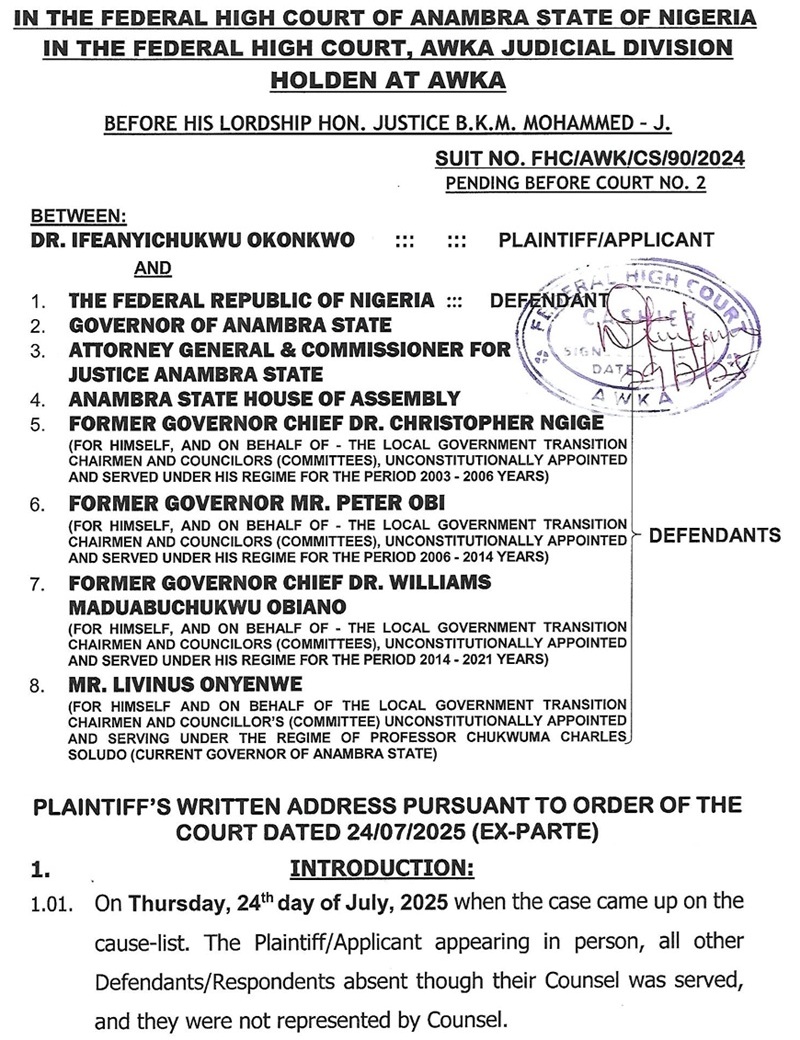
Ifeanyi Okonkwo versus Anambra State governors
Observers are waiting with bated breaths for the response and/or decision respecting Okonkwo’s fireworks.
For more details on what the plaintiff is asking the court to decide on, read the following article:
Anambra: Ngige, Peter Obi, Obiano, Soludo in trouble over LGs FAAC Allocations
For Diaspora Digital Media Updates click on Whatsapp, or Telegram. For eyewitness accounts/ reports/ articles, write to: citizenreports@diasporadigitalmedia.com. Follow us on X (Fomerly Twitter) or Facebook



